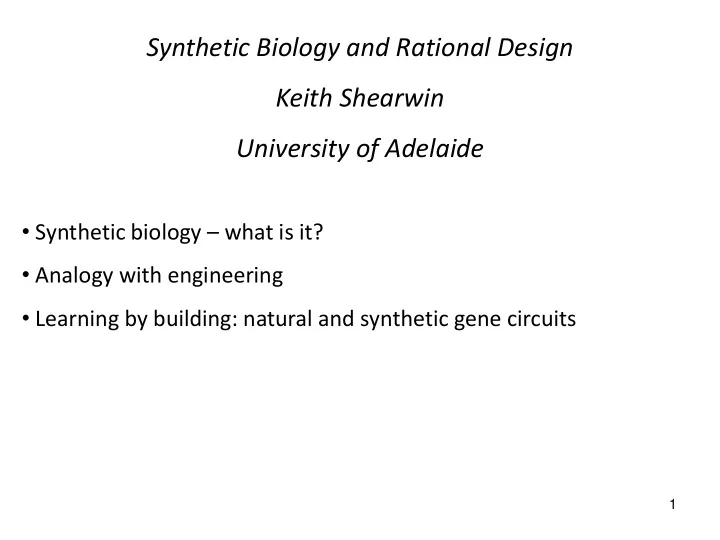

Synthetic Biology and Rational Design Keith Shearwin University of Adelaide • Synthetic biology – what is it? • Analogy with engineering • Learning by building: natural and synthetic gene circuits 1
(2) (1) 2
(1) Understand natural circuits “The complex genetic circuits found in cells are ordinarily studied by analysis of genetic and biochemical perturbations. The inherent modularity of biological components like genes and proteins enables a complementary approach: one can construct and analyse synthetic genetic circuits based on their natural counterparts. Such synthetic circuits can be used as simple in vivo models to explore the relation between the structure and function of a genetic circuit.” 3
(2) Build useful stuff – rational design Examples of applications of synthetic biology 4
Malaria ~ one million deaths annually, mostly children Artemisinin: Anti-malarial compound found in plant 5
Produce artemisinin in microorganisms 6
Produce artemisinin in microorganisms Enzymes from 3 species, plus extensive modification of individual steps Initial attempts yielded ~0.1 g/L 2012: yield ~40g/L. Over express all enzymes, in yeast Some metabolic engineering, some high throughput screening. 7
Early 2013 - Sugar cane - 200 000 litre fermentors ~ tens of tonnes Sell at cost price Profit from other pathway intermediates - Farnesene (long chain hydrocarbon) http://www.zagaya.org/2012/12/culmination-of-the-artemisinin-project/ 8 http://www.nature.com/news/malaria-drug-made-in-yeast-causes-market-ferment-1.12417
Building new circuits – analogy with engineering 9
Synthetic Biology: analogy with engineering - modularity - standardisation - mathematical description 10
Modularity 11
Standardisation - engineering Consistent building blocks 12
Standardisation - biology Standard plasmids Interchangeable parts Standard method of assembly (Biobricks website) 13
Standardisation - biology 14
Standardisation - biology 15
Mathematical model Design Build Refine Test Allows the ability to make and test predictions about - Circuit behaviour (toggle switch, repressilator) - Stability - Robustness against perturbations - Effect of biological noise arising from low numbers of molecules (stochastic simulations) 16
Synthetic Biology • Challenges of Synthetic Biology • Technological advances • Risk and Safety 17
Challenges for Synthetic Biology 18
Technological Advances 1. Fluorescent proteins/single cell microscopy Time lapse movies single cells -follow dynamics of multiple components of a given circuit 19 -correlations between outputs
Technological Advances 1. Fluorescent proteins/single cell microscopy Time lapse movies single cells -follow dynamics of multiple components of a given circuit 20 -correlations between outputs
Technological Advances 2. DNA synthesis 21
Technological Advances 2. DNA synthesis 22
Technological Advances 2. DNA synthesis http://www.idtdna.com/pages/products/genes http://www.invitrogen.com/site/us/en/home/Products-and- 23 Services/Applications/Cloning/gene-synthesis/gene-strings-dna- fragments.html#7
Synthetic Biology Risk and safety Reputable companies check requested sequences 24
Risk and Safety 25
Polio virus 26
Technological Advances 2. DNA synthesis 1970 – chemical synthesis of one gene 207bp long (took > 1 year) (2002) 7440 bp, 2 years, ~$10/bp (2010) 1 077 947 bp Next? 27
Technological Advances 2. DNA synthesis http://syntheticyeast.org/
Example of use of DNA synthesis Biofuels 29
Production of methyl halides (CH 3 I) by microorganisms from biomass -precursors for petroleum 1. BLAST search for methyl halide transferases (MHT), including metagenomic data (eg seawater) 2. Chemical synthesis of each DNA encoding the gene sequences. No need to culture or even identify the organism. No cloning! 3. Express proteins and assay enzyme activity 30
Learning by building: natural and synthetic gene circuits Study DNA looping energy in vivo
Learning by building: natural and synthetic gene circuits 300bp spacing
Monte Carlo Fitting
Learning by building: natural and synthetic gene circuits 10000.0 1000.0 100.0 j 10.0 1.0 0 2000 4000 6000 8000 10000 Separation (bp)
Learning by building: phage lambda 43
Learning by building: phage lambda RNAP More complex system - 6 operators - 3 promoters - enhancer like element (UP) 44
Learning by building: phage lambda 45
Perturb the system – mutants 46
Learning by building: phage lambda Small improvements to binding - Change in gene expression levels - Mimic eukaryotic enhancer elements Development of new tools for synthetic biology - Incorporation of distant binding sites 47
Learning by building: synthetic gene circuits Bistability – mutually exclusive states 48
Learning by building: synthetic gene circuits Mixed feedback loop - bistability 49
Learning by building: synthetic gene circuits Mixed feedback loop - bistability Design Build Refine Test 50
Learning by building: synthetic gene circuits Design - Components from phage 51
Learning by building: synthetic gene circuits Mixed feedback loop - bistability Stable states where production = degradation 52
Learning by building: synthetic gene circuits Design 53
Learning by building: synthetic gene circuits Design Hysteresis - Characteristic of bistability 54
Learning by building: synthetic gene circuits Design 55
Learning by building: synthetic gene circuits Build 56
Learning by building: synthetic gene circuits Test Hysteresis x Sharp transitions 57
Learning by building: synthetic gene circuits Refine Stochastic simulations - ‘Noise’ in transcription - Flipping from one state to the other 58
Learning by building: synthetic gene circuits Refine 59
Learning by building: synthetic gene circuits Refine Redesign system to reduce noise: - plasmid copy number - growth rates But intrinsic noise in biological processes unavoidable! 60
Synthetic Biology and Rational Design • Synthetic biology – what is it? • Analogy with engineering • Learning by building: natural and synthetic gene circuits Funding 61
Recommend
More recommend